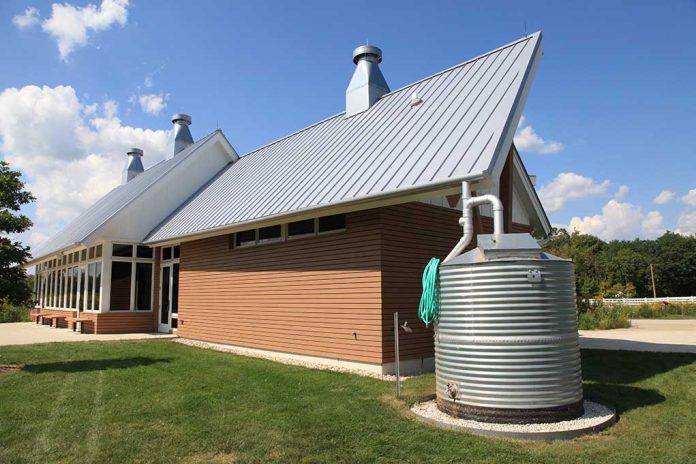
(TacticalNews.com) – Nothing comes for free, except the weather — or does it? Rainwater harvesting involves using technology to collect, store, and purify rain instead of letting it run off. Installing a system is a great way to ensure you don’t run out of water in a survival situation. Unfortunately, it’s not as simple as you might think.
The Legality of Rainwater Collection
There are no restrictions or regulations regarding the collection of rainwater at the federal level. The burden falls on the individual states to decide the legality of collecting rainwater.
Rainwater collection is legal in all 50 states to some extent. There are states where the act is legal with no restrictions, while others restrict or regulate it. Others offer incentives to encourage people to collect rainwater.
States That Encourage Rainwater Collection
The following 11 states encourage the collection of rainwater as of the beginning of 2021:
- Connecticut: encouraged, not incentivized.
- Delaware: incentive programs are sponsored to encourage citizens to collect rainwater.
- Florida: encouraged, some counties offer tax incentives.
- Hawaii: highly encouraged.
- Indiana: highly encouraged.
- Maryland: certain counties offer incentives.
- Michigan: encouraged.
- Nebraska: promoted by several universities.
- New York: encouraged and rainwater collection is taught.
- Rhode Island: incentives are provided and a tax credit equal to 10% of the installation of a cistern.
- Virginia: income tax credits are granted to those collecting rainwater.
States Where Collection is Legal
There are 17 states that allow the collection of rainwater without restrictions or encouragement.
- Alabama: considered a private property right.
- Alaska: rainwater collection is the primary source of water for many people, groundwater collection is regulated.
- Arizona: cities and towns are allowed to establish a fund for rainwater collection systems.
- Iowa.
- Kansas: no permit is needed as long as the water is used for domestic purposes.
- Kentucky.
- Maine.
- Mississippi.
- New Jersey: eligible systems receive a rebate through the Department of Environmental Protection’s Capture, Control, and Conserve Reward Rebate Program.
- Oklahoma: grants are initiated through the Water for 2060 Act.
- South Dakota.
- Tennessee.
- Vermont.
- Washington: permits are not required for rooftop collection systems.
- West Virginia.
- Wisconsin.
- Wyoming.
States With Regulations or Restrictions
The following states are a bit more restrictive when it comes to harvesting rainwater, requiring the use of a permit and, in some instances, special privileges. If you live in these states and want to collect rainwater, you’re going to find it much more difficult than previous states on this list.
Arkansas
The collection of rainwater is allowed in Arkansas with some restrictions. Arkansas Code Annotated Rainwater § 17-38-201 states that the water collected can be used for non-potable purposes. However, it is only allowed if the system used was built by a state licensed professional. Cross-connection safeguards must be met as well as compliance with the Arkansas plumbing code.
California
Honestly, it comes as no surprise that California regulates rainwater collection since it is known for its extensive restrictions on just about everything else. Under the state’s Rainwater Capture Act of 2012, rainwater collection systems can be installed and maintained for residential, commercial, and governmental purposes under certain specified conditions.
Colorado
Residents are permitted to collect a combined 110 gallons between two rain barrels under House Bill 16-1005. Individuals can only use the water at the collection site and only for outdoor purposes.
Georgia
Rainwater harvesting is closely regulated and the collected water can only be used for outdoor purposes. The Department of Natural Resources is responsible for the regulation of these collection systems.
Idaho
Collecting rainwater is allowed in the state of Idaho as long as it does not interfere or impede the collection rights of another individual. Additionally, diffused surface water is also allowed to be collected. However, water cannot be collected if it has entered a natural waterway.
Illinois
Rainwater collection is heavily regulated in this state. The collection system must comply with the state plumbing code. Additionally, the water that’s collected can only be used for non-potable purposes.
Louisiana
Rainwater is legal to collect. However, large collection tanks are required to have covers as per state statute.
Nevada
Under NB74, the collection of rainwater is allowed as long as the water is used for the permitted purposes. If the water is used for other purposes, the owner risks having their water rights revoked.
North Carolina
House Bill 609 states that statewide assistance will be provided to ensure the best water reuse and collection practices are being used. The Department of Environmental and Natural Resources is tasked with providing such assistance.
Ohio
Under Ohio Rev. Code §3701.344, the collection of rainwater is permitted. The collected water shall be used for both potable and non-potable uses as long as the number of people provided drinking water is less than 25.
Oregon
Oregon mandates people locate their collection system on a rooftop.
Texas
The collection system must be incorporated into the design of the home or building under House Bill 3391. A written notice must be provided to municipalities.
Utah
The collection of rainwater is allowed as long as the person collecting it owns the property. If the person is affiliated with the Department of Water Resources, additional restrictions and regulations may apply. Registered people can store 2,500 gallons. An unregistered person can only store water using two containers and adding up to no more than 200 gallons.
Final Thoughts
Rainwater collection is perfectly legal with some restrictions in all 50 states. Nonetheless, you need to research the applicable state and local laws where you live. It’s also a good idea to look into possible incentives or tax credits you may receive if you start collecting rainwater.
If you’re interested in adopting a more sustainable lifestyle, you should take the time to research optimal locations. Check out how you can find a property that’ll give you a better chance at surviving on your own.
Copyright 2021, TacticalNews.com



















